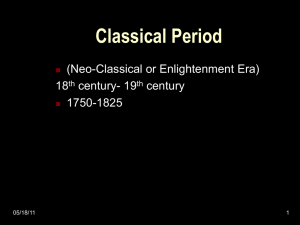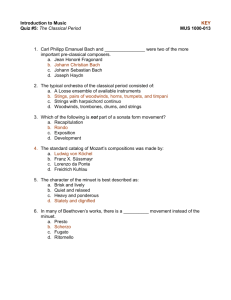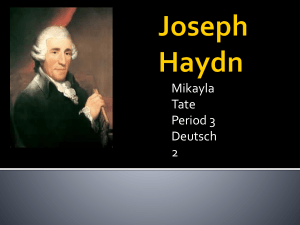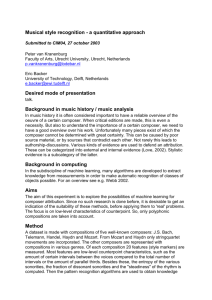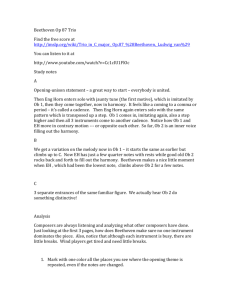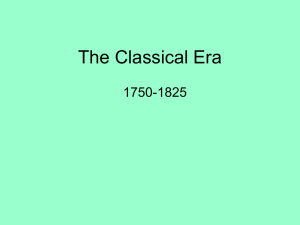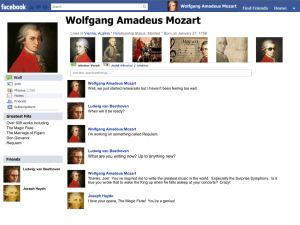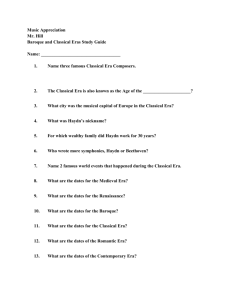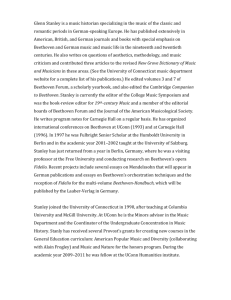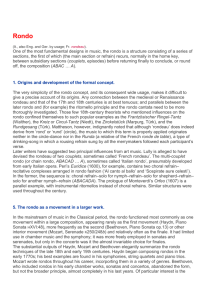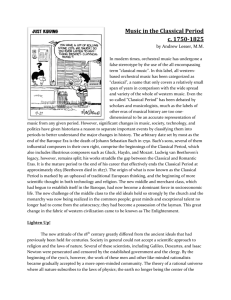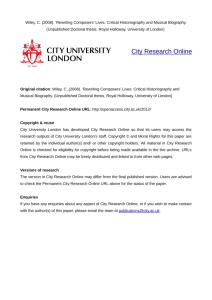Music in the Classical Period What is Classical Music? Why
advertisement
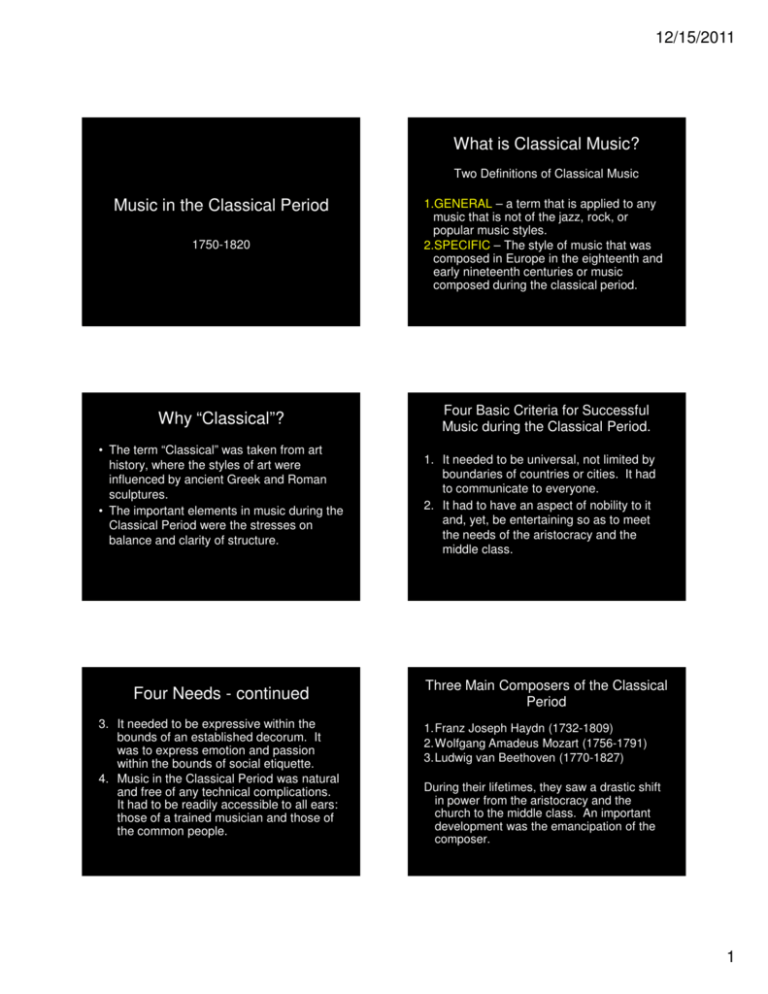
12/15/2011 What is Classical Music? Two Definitions of Classical Music Music in the Classical Period 1750-1820 1.GENERAL – a term that is applied to any music that is not of the jazz, rock, or popular music styles. 2.SPECIFIC – The style of music that was composed in Europe in the eighteenth and early nineteenth centuries or music composed during the classical period. Why “Classical”? Four Basic Criteria for Successful Music during the Classical Period. • The term “Classical” was taken from art history, where the styles of art were influenced by ancient Greek and Roman sculptures. • The important elements in music during the Classical Period were the stresses on balance and clarity of structure. Four Needs - continued 3. It needed to be expressive within the bounds of an established decorum. It was to express emotion and passion within the bounds of social etiquette. 4. Music in the Classical Period was natural and free of any technical complications. It had to be readily accessible to all ears: those of a trained musician and those of the common people. 1. It needed to be universal, not limited by boundaries of countries or cities. It had to communicate to everyone. 2. It had to have an aspect of nobility to it and, yet, be entertaining so as to meet the needs of the aristocracy and the middle class. Three Main Composers of the Classical Period 1.Franz Joseph Haydn (1732-1809) 2.Wolfgang Amadeus Mozart (1756-1791) 3.Ludwig van Beethoven (1770-1827) During their lifetimes, they saw a drastic shift in power from the aristocracy and the church to the middle class. An important development was the emancipation of the composer. 1 12/15/2011 Three Stages of Composer Emancipation The War of the Buffoons 1. Servant – Haydn chose to live and compose as a musical servant to a wealthy aristocratic family. 2. Break Away – Mozart attempted to break away from the servant lifestyle. While he was successful as a composer, he died in poverty. 3. Freelance Composer – Beethoven was the first major composer to live as a freelance artist. He was able to choose what he composed, thus setting a standard for the composers that would follow him. • Opera during the Classical Period became much more refined than in the Baroque. • The War of the Buffoons became a war of words between the supporters of French and Italian opera. • The Italians invented opera with the works of Monteverdi. They became tired of serious subjects and chose a more comedic approach called OPERA BUFFA. • The French undertook opera (after the Italians) as a new art form and believed that serious opera was the only viable form. The War of the Buffoons – con’t The Main Players Chain of events: • In 1752 a troupe of Italian singers presented the comic opera La Serva Padrona (The Servant Mistress) by Giovanni Battista Pergolesi (17101736) to the French court. • Some in France liked the new style while others didn’t. • Caused a dramatic reaction in France and caused the war of words between those that favored the traditional French court opera and those who saw the Opera Buffa as a viable art form. Underlying Cause • The war of the buffoons was a contest between the rising middle-class, or bourgeois, art, and the falling aristocratic art. • This is happening while the French middle-class is beginning to challenge the authority of the ruling class in all aspects of life. • This is one of the events that leads to the French Revolution. French Court Opera • King Louis XV • Madame de Pompadour • French Aristocracy • They favored the traditional French style because of what it represented – French entitlement and divided social classes. Opera Buffa • Queen of France • Group of people called the Encyclopedists. • They favored the comic form because of its expressive melody and natural sentiment. Change and Resolution Can’t we all just get along? • Rousseau wrote a comic opera entitled Le Devin du Village (The Village Soothsayer) in 1752 that secured Italian comic opera as a viable art form in 18th century classical music. • Christoph Willibald Gluck (1714-1787) combined the elements of the French Court Opera and Italian Comic Opera into a new style that was adopted across Europe. • This style laid the foundation upon which Mozart and other great composers would base their works. 2 12/15/2011 The Big Three Composers •Haydn •Mozart •Beethoven Let’s learn about them in detail. Franz Joseph Haydn • Lived from 1732-1809 • Born in a small village in lower Austria called Rohrau. • Son of a wheelwright and began his musical career as a chorister in St. Stephen’s Cathedral in Vienna. • Remained there until he was 16 years old when his voice changed. • After leaving the cathedral, he lived in an attic with an old harpsichord in Vienna, and began his compositional career. • Starting out, he was barely able to support himself and often joined bands of roving musicians who performed in the streets of Vienna. • Haydn would later use the many folk tunes he performed in his most famous compositions. • It wasn’t long that Haydn was noticed by the aristocracy in Vienna. • He was invited to live in the country house of a nobleman and was given a small group of musicians to function as an orchestra for him. • For the next several years, he was able to experiment with different instruments and combinations of instruments as a part of his orchestra. • In 1761, at the age of 29, Haydn was employed by the Esterhazys, a family of Hungarian background who were famous for the patronage of the arts. • This relationship would continue for over 30 years. • The musicians acquired by the family were the best in Europe….all under Haydn’s control. • Haydn had an orchestra, opera company, marionette theater, and a chapel. • When the prince died, Haydn was released of service. • He traveled to England in 1791 and 1794 where he was very successful. • He returned Austria very wealthy and laden with honor. • He died in 1809 and was acknowledged throughout Europe as one of the premier musicians and composers of his time. 3 12/15/2011 Question Countdown 1. Where was Haydn born in 1732? 2. Was Haydn’s father a musician? If not, what line of work was he in? 3. Where did Haydn begin his musical career? 4. What happened at the age of 16 that ended his chorister career? 5. How did he make his living in his early years? 6. How would Haydn’s background during his early years affect his compositions in later life? 7. What was the name of the family that Haydn attached himself to in 1761? 8. What was the quality of the musicians acquired by the Esterhazys? 9. What event precipitated the release of Haydn from the Esterhazys’ service? 10. What country did he travel to twice – once in 1791 and again in 1794? Wolfgang Amadeus Mozart • Born in Salzburg, Austria, in 1756. • Son on Leopold Mozart, a famous composer and violinist in the court of the Archbishop of Salzburg. • Mozart began his career before he was five years old. • He was deemed a child prodigy (someone who excels at an early age). • He was dismissed by his final patron, the Archbishop of Salzburg and established himself in Vienna as a free artist. • He did pursue an official appointment from Emperor Joseph II and received it, but was only given simple tasks like composing dance music for the court balls. • In 1782, he married Constance Weber which greatly upset his father (a very domineering father). • Began composing before the age of five. • Performed in the court of the Empress Maria Theresa of Austria. • The following year, he performed in Paris. London, and Munich for the aristocracy. • By the time he was 13, he had written sonatas, concertos, symphonies, religious works, and several operas. • He was a free spirit and often enraged his patrons that he was dismissed from service. • Constance was unable to help Mozart financially in any way. • He was cut off financially from his father due to the marriage. • Due to his free spirit actions and lack of decorum, he wasn’t given the financial remuneration (compensation) that was due considering his genius and ability. • Mozart died in 1791 at the age of 35, broke. • His music wasn’t performed with great regularity until after his death. • He became famous after his death. 4 12/15/2011 Ludwig van Beethoven Ludwig van Beethoven • Born in Bonn, Germany on December 16, 1770 • The area around Bonn is also called the Rhineland. • Father and grandfather were singers at the court of a local prince. Beethoven’s Early Life Beethoven Meets the Musical Elite • Tough family life growing up. • Father was addicted to alcohol • Young Beethoven was forced to assume the support of his mother and two younger brothers. • At age 11, he was the assistant organist in the court chapel. • At age 12, he was the harpsichordist in the court orchestra. • At age 17, he visited Vienna and played for Mozart. Mozart remarked, “Keep an eye on him – he will make a noise in the world someday.” • At age 22, he studied with Haydn in Vienna. • Haydn didn’t really care for Beethoven due to Beethoven’s volcanic temperament and free spirit. Beethoven Breaking Free Say what? • His abilities as a pianist earned him great respect and notoriety among the aristocracy and was welcomed into the homes of the rich and powerful. • Functioned well in a modified patronage system which meant that he wasn’t directly attached to a specific court, he composed for many families. • Another development was the increase in music publishing. His music was performed and heard throughout Europe. • When Beethoven was in his late 20s, he began to experience the initial symptoms of going deaf. • By 1802, he was completely deaf and often considered taking his own life. • For the next 25 years, he found the strength to continue to compose and conduct concerts. 5 12/15/2011 How did he do it? • Many of Beethoven’s most famous and popular compositions were composed when he couldn’t hear them being performed. • He could only hear the compositions in his head. • In the beginning, he would cut the legs off his piano and place his ear to the ground to feel the vibrations. • He would never hear the applause that the crowds gave him. The Death and Legacy Question Countdown The Death and Legacy • A long carriage ride in inclement weather brought on an attack of dropsy that proved fatal. • He died on March 26, 1827 at the age of 57. • For at least 100 years after his death, composers looked to his compositions as the standard of excellence for their own. 1. What was young Mozart deemed? 2. What is that area of Germany that Beethoven often called? 3. What was Mozart's last appointment? 4. What was Mozart's father's occupation? 5. At age 12, what was Beethoven's job? 6. Who said of Beethoven, “Keep an eye on him-he will make a noise in the world someday”? 7. Why did Haydn not particularly care for Beethoven? 8. What development during Beethoven’s life enabled his music to be performed and heard throughout Europe? 9. When Beethoven was in his 20’s, what dreadful curse afflicted him? 10. Following Beethoven’s death, why did composers still look to his compositions? 6
